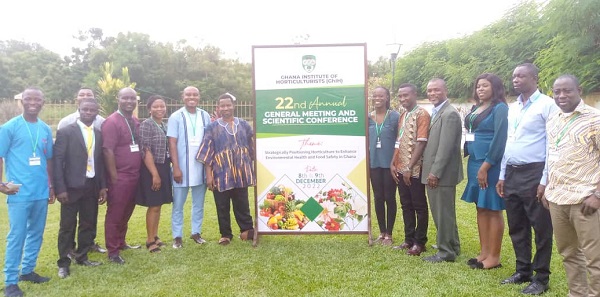
Illegal mining affecting food produce - UG Vice Chancellor
The Vice Chancellor of the University of Ghana, Professor Nana Aba Appiah Amfo, has stated that illegal mining activities, popularly referred to as galamsey, had exposed food produce to a high risk of contamination through the use of polluted irrigation water by farmers.
Illegal mining activities, she said, also negatively affected the quality of the environment as it had led to the destruction of large hectares of forest and pollution of water bodies in the country.
Advertisement
“Also, illegal mining activities were negatively affecting agricultural and horticultural crop production in the country, leading to low levels of production and decreases in foreign exchange from the export of horticultural crops,” she indicated.
The UG Vice Chancellor made this known in a speech read on her behalf by the Vice-President of the Ghana Institute of Horticulturists, Philip Quaye, at the 22nd Annual General Meeting and Scientific Conference at the University of Ghana, Legon, in Accra.
Conference
Horticulture covers the cultivation of flowers, vegetables and fruits and the conference attracted representatives in the ecosystem.
It was on the theme: ‘Strategically positioning horticulture to enhance environmental health and food safety’.
Horticulture crop production, Prof. Appiah Amfo said, provided jobs for over 70 per cent of the population in Northern Ghana.
Also, she intimated that the expansion of the horticultural industry also had the tendency to create huge jobs across the entire horticultural value chain, namely input supply, production, processing, transportation, storage, as well as marketing.
She listed some of the non-traditional export crops that were significant for employment in the horticultural industry to include shea nuts, mango, cashew, herbal and medicinal plants, while other crops with potential for generating employment include high-value vegetables and cut flowers.
Alternative employment
Women in Ghana, Prof. Appiah Amfo said, stood to benefit a lot from the expanded horticultural industry as horticultural crops were suited to smaller holdings and women had access to marginal land holdings, especially in northern Ghana.
"Women also play vital roles in value addition to horticultural produce as they are the main actors in the processing and preservation of high value vegetables and fruits," she said.
She called on the government to partner with the GhIH to provide alternative employment through sustainable horticultural production to solve the youth unemployment challenge.
Additionally, she said the development of the horticultural export sector, especially non-traditional crops, could improve income for the vast majority of smallholder farmers, as well as the vulnerable sub-populations in Ghana.
Value addition to horticultural produce, she said, would create huge industrial development opportunities in rural areas that would stem the tide of migration of the youth to cities in search of non-existing jobs.
Prof. Appiah Amfo, therefore, called for close collaboration with all stakeholders, the private sector, including the relevant Ministries, Departments and Agencies for the success of all horticultural interventions.
Objective of institute
The President of the Ghana Institute of Horticulturists, Prof. Halim Abubakari, said the Institute over the years had contributed scientifically and professionally to the growth of the horticultural industry in Ghana.
Horticulture, he said, played a huge role in sustaining environmental health and food safety globally.
"The horticultural industry has a wide range of benefits, including its contributions to a country’s GDP, and employment, among others, and the Ghana Institute of Horticulturists is privileged to have been a key stakeholder in championing this course," he said.
Objectives of the institute, he stated, included securing the maintenance of professional standards and the advancement of horticulture in Ghana; encouraging the publication of books, periodicals and journals on horticulture; promoting research in all aspects of horticulture.
It is also to facilitate the dissemination and exchange of information and ideas relating to or concerning Horticulture and seeking the professional welfare of its members.




